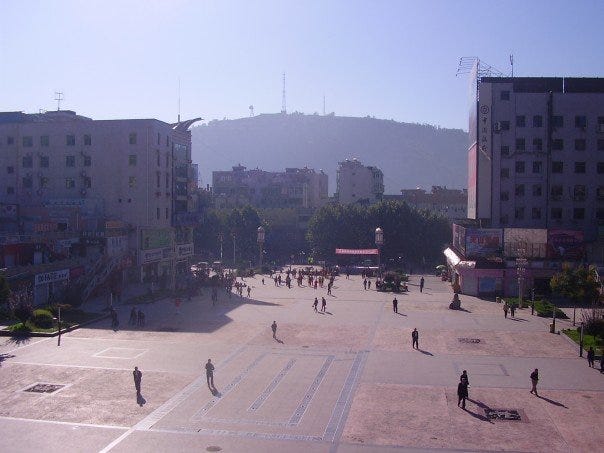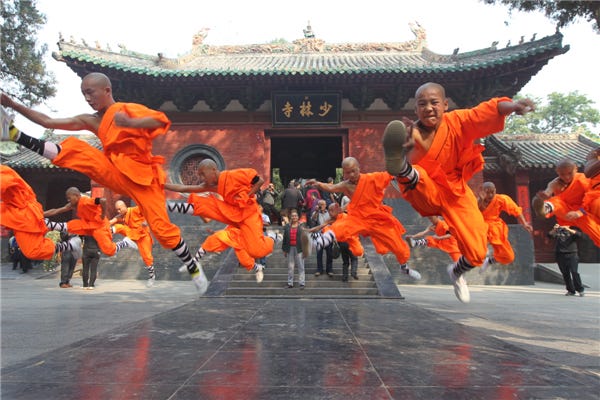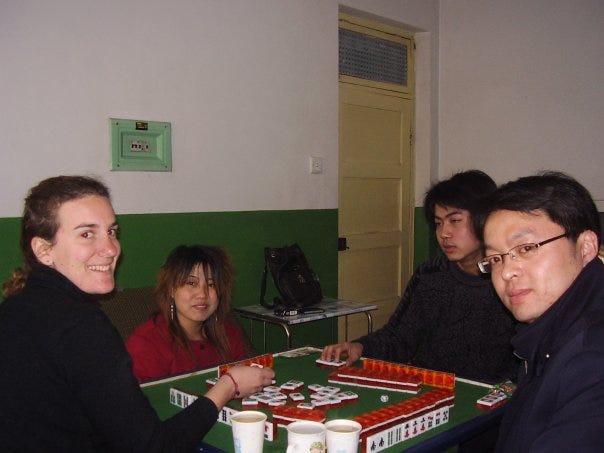If you ever go to China, there may come a time when someone offers you meat. If you’re in a small or medium-sized city, it might be on a stick, barbecued on the side of the road. You might recognize chunks of chicken, but it could just as easily be strips of tripe or offal skewered on the thin length of bamboo.
Or, you could be invited to a restaurant where everyone will sit at a round table and plunge chopsticks into a multitude of dishes that fill a spinning glass platter, pulling morsels of richly flavored chicken, pork, or mutton out onto small bowls of rice before scooping the mixture into their mouths. You’ll probably enjoy the variety and the luxury of not having to make any choices about what to order and not feeling envious of your neighbor’s meal.
But maybe you could find yourself at a special occasion. They may serve something extra special in honor of the day, or worse, in honor of you.
“Gǒu ròu”, someone will say, with a smile that tells you how special it is.
You’ll hesitate but, not wanting to be rude, scoop some into your mouth. It will melt like soft butter and you’ll smile and say “Mm, hǎo chī,” because you’ve learned enough Chinese to say when something tastes good.
Your host will be pleased, but you’ll squirm a little inside, because you also learned that the word “ròu” means meat, and the word that precedes it tells you what animal meat it is. And you know that the word “gǒu” means dog.
This happened to me a couple of times when I lived in China.
There was a full solar eclipse coming up. Everyone I knew in the small town where I lived was collecting pieces of x-ray film to peer up through and planning their whereabouts for the day. It was due to happen in the early evening but it was summer and the sun would still be very much in the sky.
My closest friend who wasn’t a colleague at the school where I taught English was a woman at least 20 years older than me. She owned a nightclub just off the main square. Everyone called her Jiang Jie, which means “Big sister Jiang”.

Hers was one of the only locations I knew that kept the beer in the fridge and she always offered me a free one when I came in, probably because I stood out as the only foreigner in town, or maybe she just liked me. Maybe a bit of both.
After a few nights of dancing and getting to know each other, she started inviting me out to other clubs and to restaurants or to play mahjong or visit friends. She would call me and tell me to hop into a taxi and give my phone to the driver so she could tell him where to take me.
She didn’t speak a word of English, but by the time we met, I’d been living in China for several months and could get by, even if I couldn’t explain an address to a taxi driver. You have to understand that addresses weren’t addresses. They were complicated instructions to nameless streets and landmarks, for which I had no context whatsoever.
So, the night of the eclipse, she tells me she’s going to a special restaurant on top of one of the hills that surrounds the town of Tongchuan, which sits in a long valley.
The tables sprawling outside were all filled with excited townsfolk, anxious to get a clear view of the slowly setting sun. Jiang Jie explained that it was one of the few places around that served dog, a rare delicacy. No one ate it regularly, but on special occasions, it was a treat. I ate along with everyone else, curious to try despite my misgivings, and admitted it was good, and perhaps no less ethically grey than eating factory farmed animals.
And the eclipse was magic. The darkening of the sky, the quieting of the birds as they were tricked into thinking that night had suddenly fallen, our surprise as the stars came out for those few minutes… And we all stared through our rectangles of x-ray film at the vivid corona surrounding the perfectly round moon.
It was an unforgettable evening.
My second taste of dog was much more traumatic because I basically knew the dog we were eating.
I had finished my teaching semesters and was traveling in the south of the country. I went on a hike up the folklorically named Tiger Leaping Gorge.
On the long ascent, I found myself alongside an English guy called Matt and we got chatting. He was going to stay at a hostel at the top of the mountain for three months, training under a kung fu master. Intrigued, I decided to cut my hike in half and booked a room there too so I could meet the shifu, whose name was Ding Yi.
Ding Yi’s English was just good enough to share his expertise with his foreign pupils, but he and I chatted long into the night in Chinese. I had visited the Shaolin Temple on my travels and considered staying a while there to train, but decided against it because of the cost and scale of it.

The following day, I hiked down the other side of the Tiger Leaping Gorge but couldn’t get Ding Yi out of my mind. On the overnight bus ride to the next city, I slept in fits and starts and awoke with a surety that I had to return. I got on the next bus back the way I’d come, hiking the three hours up the mountain to the same hostel with a couple of English backpackers who were so inspired by the idea that they signed up for a week with the master too. My visa allowed me to stay for six weeks.
Living at the hostel was beautiful but basic. The views were a marvel to wake up to every day but the toilets were in one corner of the large property next to the only sink with running water, which was a long metal trough. Showers were cold and the air was colder.
The meals were included in the nightly price, and they were served outside on long wooden tables, or occasionally us longterm guests were invited into the owners’ rooms with the heaters and comfortable rugs and cushions. The owners had a pair of tiny dogs that followed them around everywhere and picked up the scraps that fell from their cooking pots.
But just down from the toilet block, where most of the passing tourists didn’t go, were the captive animals. There was a sad monkey in a metal cage and a puppy tied to a post. Neither were ever allowed to roam. The puppy howled and cried at night and I could hear answers from another dog tied to a stake further up the hill.
These dogs were not pets. They were food. They kept them tied up for their whole lives so that they would not become too lean and muscular. Matt and I went to sit with them and pat them daily, giving them food and talking to them. Ding Yi insisted that our actions would make it harder for them but we couldn’t help ourselves.
Partway through the six weeks, when only Matt and I remained in the group, Ding Yi decided to move the training to his home in a rural town a few hours away.
On our final night at the hostel, our hosts treated us to a meal to thank us for our extended custom and send us off in style.
The feast they prepared consisted of a large bowl of chicken, a large bowl of pork, and a large bowl of dog. The only accompaniments were rice and Baijiu, the very popular Chinese rice wine the burns your throat and warms your belly on cold nights.
I awoke the next morning with the biggest hangover I’ve ever had but it wasn’t the Baijiu that caused it. It was the meat. I never wanted to eat meat again.
I tried not to make a big deal of it as we settled into our new location and Ding Yi’s wife and mother prepared three beautiful meals a day for us, but I couldn’t hide my disgust and I petulantly picked the vegetables from around the chunks of meat in each dish. Ding Yi himself was surprisingly understanding and never pressured me to change my mind.

You may think that you would never partake of such foods, but if you ever went to sit with the pigs before they land on your plate or the cows who cry all night after their calves are taken away so you can enjoy the milk nature prepared for them, you may change your mind.
I’m not a full vegetarian anymore; I now eat fish, seafood, and poultry, but the more I learn about it, the more I think I should stop even that. We slaughter over 80 billion animals (yes, that’s 10 for every man, woman, and child living on Earth) each year to fill our stomachs, and most of them live in conditions much worse than those dogs in the mountains of China did.
Not only is this reprehensible on a humanitarian level, but it contributes to about a quarter of the world’s greenhouse gas emissions. One of the most powerful things you can do to help the climate crisis is to reduce or stop your meat consumption.
The only red meat I’ll touch is kangaroo, because there are millions living wild in Australia and they sometimes need to be culled, but eating wild caught animals at scale would quickly rid the Earth of the few remaining terrestrial mammals.
I didn’t set out to write about eating meat, but by thinking about my response to the dogs of China who live terrible lives to be served up on very special occasions, I couldn’t help but consider the complacency with which our society treats our livestock, which many of us happily consume two or three times a day.
We really can’t pretend to be morally superior, we can only acknowledge a need to change across all cultures (except maybe India, where vegetarian is the norm, and the rest is referred to as “non-veg”), and seek alternatives wherever we can.
So tell me, would you eat the dog?
What strange foods have you eaten when traveling?
How much do you consider ethics when choosing what you eat each day?
Would you like to hear more about the experience of living in China or training under Ding Yi?










I know the feeling! We are becoming more and more vegan by the day. It’s just too unrealistic and unnecessary to keep going the way we are.
I love reading about your travels and experiences. All the stories 😊.
We went to China by a special invitation when Gerry was working. On one of the “special “ dinners, we were served a turtle soup. The turtle was whole, stuffed and immersed in the bowl of soup except for his head and front legs. They were on the rim of the bowl and the poor turtle was looking at me with his little eyes. Yes, we had to eat the soup and the turtle. It would be a terrible insult if we didn’t……